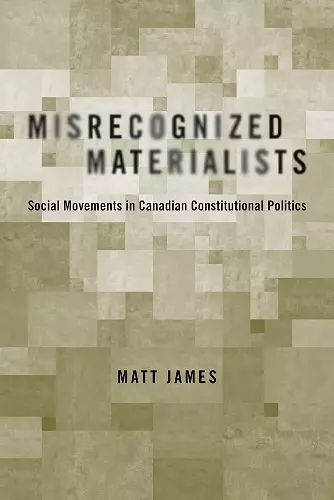Misrecognized Materialists
Social Movements in Canadian Constitutional Politics
Format:Paperback
Publisher:University of British Columbia Press
Published:1st Jul '07
Currently unavailable, and unfortunately no date known when it will be back

A truly innovative analysis on both conceptual and empirical grounds. Very few Canadian studies of social movement politics have a comparable historical reach, or examine so large a range of key movement actors, and none to date have re-interpreted social movement action via a critique of New politics theory and its applications. Matt James does much to illuminate - and legitimate - the complex cases that social movement organizations have made on behalf of social esteem and social justice. -- David Laycock, editor of Representation and Democratic Theory Misrecognized Materialists challenges the assertion that there is a deep tension between the politics of recognition and the politics of redistribution. Although 'new' social movements are often seen as reinforcing a 'postmaterialist' agenda focusing on identity and belonging, implicitly undermining an agenda of economic redistribution, Matt James convincingly shows that social movements have advanced materialist agendas from the very beginning, and have not stopped doing so. A compelling book. -- Keith Banting, co-editor of Multiculturalism and the Welfare State: Recognition and Redistribution in Contemporary Democracies
A book with provocative implications for students and scholars of social movements and identity politics, Misrecognized Materialists offers a fresh and important perspective on Canada’s constitutional struggles over civic symbolism and identity.
Canada’s history of intense constitutional debate is often depicted as a source of national embarrassment – a diversion from more sensible endeavours. Misrecognized Materialists tells a different story. Beginning with the Rowell-Sirois hearings of the Great Depression and concluding with the national unity wars of the late 1980s and early 1990s, Matt James details how groups representing marginalized constituencies – women, working-class people, and ethnocultural minorities – were able to use the Canadian constitutional arena to pursue traditionally neglected aspirations and concerns. With concrete illustrations and case studies, James questions the common tendency to interpret recognition struggles as departures from traditional “materialist” priorities such as economic security and personal safety. Ultimately, he argues that such materialist priorities were and are, in fact, at the heart of the fight for recognition for many marginalized groups.
A book with provocative implications for students and scholars of social movements and identity politics, Misrecognized Materialists offers a fresh and important perspective on Canadas constitutional struggles over civic symbolism and identity.
ISBN: 9780774811699
Dimensions: unknown
Weight: 280g
184 pages